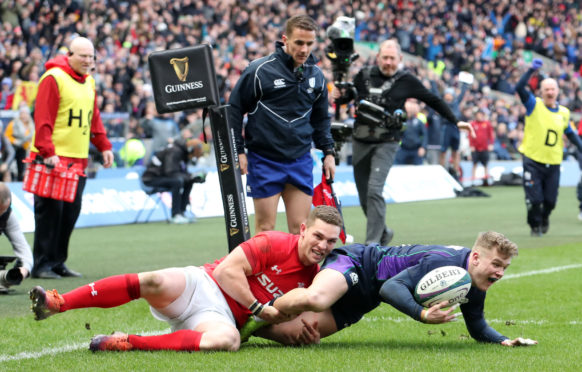Proud, plucky Scotland. To be honest, we should be heartily sick of this.
Gregor Townsend was probably just shielding his team in public when he said that pride was his overbearing emotion at the end of Saturday’s 18-11 loss to Wales. Hopefully in private he’s much more critical and cutting, because this was a game that Scotland should definitely have won.
Townsend’s team had their hands around the throat of Wales’ Grand Slam hopes with a full quarter of the game left. They’d handed the visitors a nine-point lead in the first half by conceding a woefully defended try scored by Josh Adams and team score that was methodically but aggressively earned through 23 phases for Jonathan Davies.
Only Wales had actually let Scotland off the hook, probably to the tune of at least another ten points, and it looked for all the world as if they’d pay for their profligacy.
Wales surrendered three-quarters of possession and even more of territory in the second half as Scotland poured forward.
But having got the platform, Scotland delivered just one try. Heroic comebacks – as some were mystifyingly calling this – are only really heroic when they succeed. If they fail despite having most of the odds in your favour, then frustration and anger more than pride that should be the overriding emotions.
Scotland have recently been pretty good at moving the ball in hand into the opposition 22 – statistically they’re one of the best in the world game at doing it. However they’re bang average at scoring from possession inside the 22 against a determined set defence, certainly compared to Ireland (the world leaders in this area) Wales and England.
Saturday’s second half followed this script, indeed it was like watching the Scotland team in the early part of this decade when Andy Robinson was head coach and Townsend attack coach, a mixture of Blitzkreig followed by trench warfare whenever the team got within sight of the goal-line.
They always seemed over-desperate and sometimes even frantic for the try, even after effectively piercing the admirable Welsh defence with a set-move try for Darcy Graham with 20 minutes to play. Finn Russell missed the tight conversion, which may have had a part to play in the rather disjointed attempts to force a score that followed.
Taking a shot at goal from one of the many penalties Wales conceded, or even trying a simple drop goal, might have turned the screw further; with Hamish Watson on the pitch and several other strong runners, Scotland were consistently making good ground in open field and could easily have tightened the pressure valve again.
Instead there seemed a pre-occupation with staying in the 22 and mauling, and after a bit the Welsh slowly began to find ways to get in and spoil it. Very much like the key second quarter of the game against Ireland – had Scotland scored then how different this 6 Nations campaign might have been – the defending team looked to be on the front foot.
Part of it is maybe a personnel thing – the absence of Stuart Hogg and the finishing ability of Huw Jones may make a significant difference in Scotland’s attacking threat, in all areas of the field.
But injuries are a part of life at the top of world rugby, and we can’t be constantly relying on Hogg to open defences or having the opposition to key off on him to create scores.
Indeed, without Hogg and Jones and all the vast litany of injured players, even with the entire back three limping off leaving Adam Hastings filling at full-back while Ali Price was on the wing, Scotland still had plenty territory and possession to finish the momentum they’d built. Lack of resources was not really the issue.
Wales are hardly better off for numbers, and for all that they have a number of outstanding figures – Davies, Alun Wyn Jones, Justin Tipuric – in their team it’s still sort of amazing that this seemingly modest outfit are one win off a Grand Slam.
But there’s a good reason for that, and it’s Warren Gatland, who in his 12 years with the team has made a recurring habit of turning unpromising material into a coherent, ultra-competitive outfit. And there’s surely no coincidence he’s not lost to Scotland as a head coach – he was on Lions sabbatical two years ago – since 2001, when he was with Ireland.
There are ways Scotland can be improved; as Gatland pointed out, miles on the pitch, especially in places like Twickenham next week, will help in the long run while the likes of Blair Kinghorn in future surely won’t miss basic open-field tackles like he did for Wales’ first try.
The gradual return of personnel will help patch certain areas, although given the rate that they’re going down the chances of Townsend being able to field is strongest XV – whatever he thinks that is – are slim.
Nevertheless, even without those players, even with the referee not giving yellow cards, Scotland should still have won this game with what they had.
Rather than feeling pride at fighting back to get close to the third best team in the world, we should be frustrated and furious that they didn’t finish the job.

